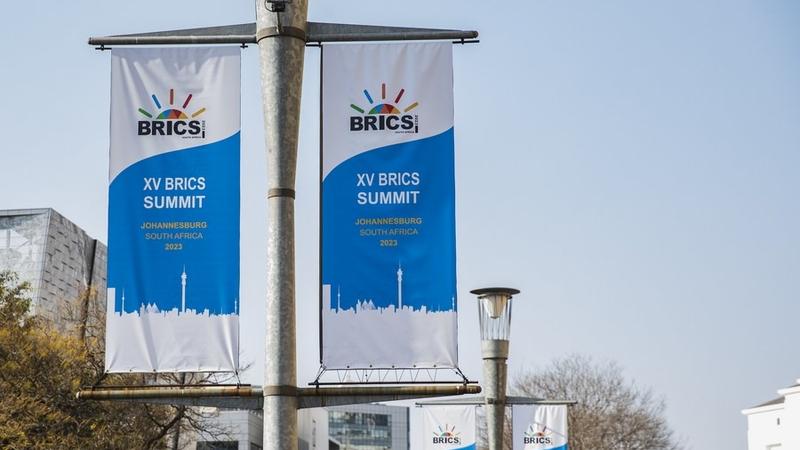 This photo taken on Aug 21, 2023 shows a view near the venue of the 15th BRICS Summit in Johannesburg, South Africa. (PHOTO / XINHUA)
This photo taken on Aug 21, 2023 shows a view near the venue of the 15th BRICS Summit in Johannesburg, South Africa. (PHOTO / XINHUA)
The entry of three Asian countries into the BRICS grouping marks a “turning point” in terms of potential economic and geopolitical consequences, while advancing the cause of a multipolar world, analysts say.
Saudi Arabia, UAE and Iran were among five countries that officially became, with effect from Jan 1, new members of the BRICS, a grouping of emerging economies that previously comprised Brazil, Russia, India, China and South Africa. Founded as “BRIC” in June 2009, South Africa became a member of the group in 2011.
Egypt and Ethiopia were the other new members that officially joined the ranks of the BRICS on Jan 1.
Apart from its considerable influence over the energy markets, the expanded BRICS will help Muslim countries diversify their economic outreach and enter non-traditional markets, said David Gibson-Moore, president and CEO of Gulf Analytica
David Gibson-Moore, president and CEO of Gulf Analytica, a business consultancy to international firms and family offices in Dubai, said a number of “far-reaching economic and geopolitical consequences arise from this (BRICS) expansion”.
ALSO READ: BRICS can help promote a fairer world order
Apart from its considerable influence over the energy markets, the expanded BRICS, he said, will help Muslim countries diversify their economic outreach and enter non-traditional markets.
“Major opportunities will arise from cross-border knowledge exchange and mutually beneficial partnerships. For instance, technology companies will be able to contribute to Middle Eastern countries’ infrastructure development,” Gibson-Moore told China Daily.
“This will bolster trade and global value chain integration and thereby attract additional foreign direct investment. For Saudi Arabia and the UAE, this development will also reinforce economic diversification and ease the transition away from petroleum-centric (growth),” he added.
Ebrahim Hashem, a former adviser to the chairman of Abu Dhabi Executive Office and former head of the strategy division of Abu Dhabi National Oil, said the newly expanded BRICS is expected to progressively become “the nucleus and driver of the new world order”, given that the grouping now represents close to 50 percent of the global population and 30 percent of GDP respectively.
“Up until recently, the BRICS grouping was viewed merely as an economic policy coordination platform,” said Hashem, who is also Asia Global fellow at the Asia Global Institute of the University of Hong Kong.
ALSO READ: BRICS enlargement can help boost confidence and promote fair and just global governance
But in the wake of the events of the COVID-19 pandemic, the Russia-Ukraine conflict and “the atrocity in Palestine”, the scope of BRICS has proven to be “more than just economics”, he said.
“The full inclusion of three Arab countries, namely the UAE, Saudi Arabia and Egypt, has added more impetus to the grouping’s momentum. Now, the BRICS members do not only coordinate their economic and energy strategies, but also their geopolitical policies, allowing them to address a wide range of regional and global challenges,” said Hashem.
“Just as they frequently met to address issues related to COVID-19 and the international financial system weaponization, the BRICS members more recently convened an emergency meeting to discuss the catastrophic situation in Gaza,” he noted.
According to the “BRICS Investment Report” published by the United Nations Conference on Trade and Development (UNCTAD) in April 2023, BRICS constituted one of the world’s most important economic blocs.
READ MORE: China's coordination within BRICS helps restore peace in ME
Looking ahead, it noted, the potential for intra-BRICS investment remains promising. But more collaboration will be required to make investment a key driver of economic cooperation among the BRICS, and “to bring more benefits for sustainable and inclusive economic development in the bloc”.
Sujoko Efferin, a professor at the Faculty of Business and Economics at Universitas Surabaya in Indonesia, told China Daily that the diverse interests and inequality in terms of the BRICS members’ size of economies “are not a major problem” since they will find a way to promote joint ventures in energy projects and enhance energy security.
“The Middle Eastern countries can contribute to infrastructure development, investment, and technological advancements within the BRICS framework. As a result, the strategic collaboration will protect their national interests,” said Efferin.
“However, it must be stressed that the BRICS members need effective coordination and mutual respect for each member's priorities. As an international coalition consisting of energy-rich nations, the collaboration will bolster the bargaining power of the group on the world stage,” he added.
ALSO READ: BRICS nations to deepen ties for sustainable tourism recovery
Deniz Istikbal, an economics researcher at the Foundation for Political, Economic and Social Research, a think tank based in Ankara, Turkiye, said the participation of West Asian countries in BRICS “marks an important turning point”.
“The organization, which has included energy source countries, can be expected to accept more actors in the future. Organizations such as G20 and G7 have begun to lose their former effective power. As a result, a process in which the new multipolar order becomes stronger awaits us,” said Istikbal.


